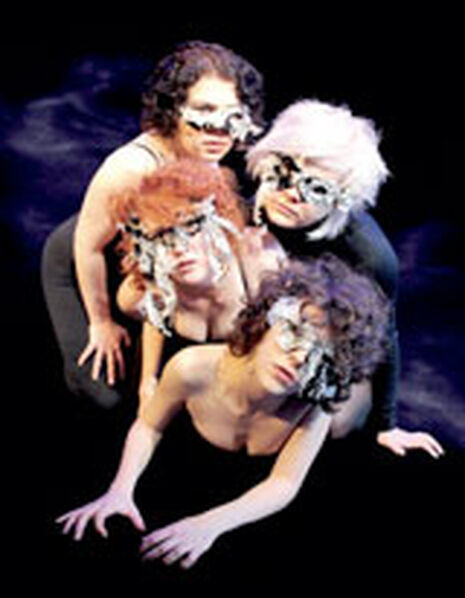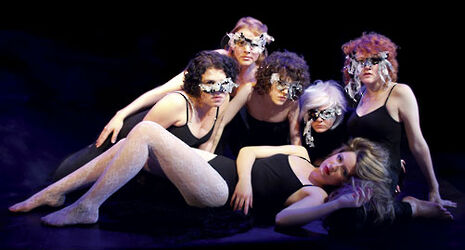A Midsummer Night’s Dream
ADC Mainshow

Enter into an industrial, monochrome forest formed on the outskirts of a city under authoritarian rule. The invitation is salivative; you dribble at the prospect of the gritty thrill ahead; a clash to some of the recent grey mainshows that the ADC has churned out. After sponging the viscid smear from your lapel, you might be shocked to discover that this is extracted from the Facebook event description of A Midsummer’s Night Dream, the ADC’s latest big event.
The expectation is dichotomised into thrill/confusion; Cambridge’s bastion auditorium has the plums to foist a seemingly incongruous (dark) reading upon one of our Will’s most seemingly harmless comedies?
This is what makes director Max Barton’s rendering such a chin-stroking watch, despite its faults. Most student productions succumb to formula, playing out an innocent amatory farce. For those who don’t know the story: a quartet of Athenian youths abandon metropolis for a mixed up romp in a forest while simultaneously a band of amateur actors (‘Mechanicals’) delve wood-deep for a rehearsal. Both groups are subjected to the japes of the resident fairies, and chaos ensues. In this take, the characters escape from a ruthless totalitarian state where a child’s defiance means death and the Mechanicals are prisoners permitted day release. Theseus (Simon Haines) forces his chained Hippolyta (Antonia Ukland) into wedlock, bringing new potency to the line ‘I wooed thee with my sword’.
But the opening’s interpretative element was mild compared with what followed: the canopy-magic of fairythicket became a steely underworld; strobe lighting forced the reading of fairies as drug addicts. These madcap scarefairies laughed maniacally, and swung sinisterly about, but the effect was overdone. The production’s failings stem from amongst other indulgent eggings of the ‘dark’ interpretation; the ocular dewing does not require accompanying substance fits to make it malevolent; it is not necessary to couple Helena’s request ‘spurn me, strike me’ with masochistic arse-gesturing. What was once subtle became blatant, and the same applied to the Mechanicals: their membership mentally impaired, a clever conceit grew tired in repetition.
The acting was, however, consistent, but for the nice exceptions of Joey Batey’s Bottom, who fruitfully reigned back on the time-old caricatured rendition, and Ellie Kendrick as Hermia, who was blissfully naturalistic, especially in the hilarious – and intricately staged – slapstick fugue. Haines, however, proved comparatively bland as Oberon; his tinman strut – fine when playing staid dictator – was disjunctive against the forest’s eye-watering gymnastics. This gait undermined his fairy-status and gave Oberon the walk of Robocop with haemorrhoids.
The set was astonishing, all giant monkey bars and detritus. The costuming of the Athenian state was well-tailored; the same cannot be said for the leotard fairywear, which looked as if designers had plundered a skip brimming with the discarded garbs of Labyrinth - another signature of the overtly conceptualised aesthetic.

The problems were not with the outstanding technical features, but a tail-wagging enthusiasm for staging over script; this occluded some of the verse’s qualities, especially between Oberon and Titania. In taking the challenging angle to something ‘safe’, Barton overdid himself, rejoining that split expectation which was once so spittle-inducing.
 Comment / Plastic pubs: the problem with Cambridge alehouses 5 January 2026
Comment / Plastic pubs: the problem with Cambridge alehouses 5 January 2026 News / Cambridge businesses concerned infrastructure delays will hurt growth5 January 2026
News / Cambridge businesses concerned infrastructure delays will hurt growth5 January 2026 News / New movement ‘Cambridge is Chopped’ launched to fight against hate crime7 January 2026
News / New movement ‘Cambridge is Chopped’ launched to fight against hate crime7 January 2026 News / AstraZeneca sues for £32 million over faulty construction at Cambridge Campus31 December 2025
News / AstraZeneca sues for £32 million over faulty construction at Cambridge Campus31 December 2025 Interviews / You don’t need to peak at Cambridge, says Robin Harding31 December 2025
Interviews / You don’t need to peak at Cambridge, says Robin Harding31 December 2025









